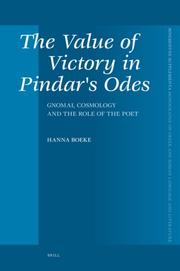| Listing 1 - 10 of 23 | << page >> |
Sort by
|
Book
ISBN: 9025606989 Year: 1974 Publisher: Amsterdam : Adolf M. Hakkert,
Abstract | Keywords | Export | Availability | Bookmark
 Loading...
Loading...Choose an application
- Reference Manager
- EndNote
- RefWorks (Direct export to RefWorks)
Cosmology, Ancient, in literature. --- Parmenides --- Hesiod --- Knowledge --- Cosmology.
Book
ISBN: 1443845388 9781443845380 1443840181 9781443840187 Year: 2012 Publisher: Newcastle upon Tyne, UK Cambridge Scholars Publishing
Abstract | Keywords | Export | Availability | Bookmark
 Loading...
Loading...Choose an application
- Reference Manager
- EndNote
- RefWorks (Direct export to RefWorks)
Homer provides an enormous challenge to the student; the potentialities of these lengthy texts are legion and the scholarship vast. The author has relied upon her knowledge of symbolic discourse to make a fresh study of the Odyssey, prioritising early neighbouring religions, their mythology, and shamanic practice. The latter has yielded particularly rich material concerning the axis of the world (axis mundi) as a route to the stars and the world of the gods. Man's shared experience of the nig...
Odysseus (Greek mythology) in literature. --- Cosmology, Ancient, in literature. --- Cosmology, Ancient. --- Ancient cosmology --- Odysseus, --- In literature.
Book
ISBN: 0930794710 Year: 1983 Publisher: Barrytown Station Hill
Abstract | Keywords | Export | Availability | Bookmark
 Loading...
Loading...Choose an application
- Reference Manager
- EndNote
- RefWorks (Direct export to RefWorks)
Book
ISBN: 8881032473 9788881032471 Year: 2005 Publisher: Reggio Emilia Diabasis
Abstract | Keywords | Export | Availability | Bookmark
 Loading...
Loading...Choose an application
- Reference Manager
- EndNote
- RefWorks (Direct export to RefWorks)
Book
ISBN: 9782406067191 240606719X 9782406067207 2406067203 Year: 2018 Volume: 11 Publisher: Paris: Classiques Garnier,
Abstract | Keywords | Export | Availability | Bookmark
 Loading...
Loading...Choose an application
- Reference Manager
- EndNote
- RefWorks (Direct export to RefWorks)
Penser le monde comme un objet fabriqué fut une nouveauté d'ordre cosmologique dont l'arrière-plan poétique passe souvent inaperçu dans l'histoire de la philosophie. De fait, avant qu'il ne serve à caractériser l'action de certaines divinités démiurgiques, le savoir-faire de l'artisan fournit aux poètes archaïques le paradigme de leur propre travail sur le matériau du langage : on construit un chant comme on bâtit un char, comme on tisse une toile. Comment la technique, thème par excellence de la réflexion poétologique, devient-elle aussi le paradigme qui rend intelligible l'origine du monde ? C'est la question à laquelle tente de répondre cet ouvrage à partir de textes d'Homère, Hésiode, Parménide et Empédocle.
Book
ISBN: 9780866985277 Year: 2018 Publisher: Tempe, Arizona : ACMRS,
Abstract | Keywords | Export | Availability | Bookmark
 Loading...
Loading...Choose an application
- Reference Manager
- EndNote
- RefWorks (Direct export to RefWorks)
In this study, Uhlfelder (recently deceased) argues convincingly that, in portraying his literary persona as an exemplum of man in his quest for self-knowledge, Boethius has made the whole Consolatio a cosmic image representing man as microcosm. The mental faculties of sensus, imaginatio, ratio, and intellegentia are arranged as a proportion suggesting both Plato’s famous “divided line” at the end of Book 6 of the Republic and, at the same time, the four elements of the physical cosmos which, according to the Platonic Timaeus, are connected with one another so as to form a geometrical proportion. The philosophical argument of the Consolatio in books II through V comprises another cosmic image with III. M.9 at its exact center; in addition, the other three cosmic depictions, revolving as concentric circles around III. M.9, may be viewed as forming an image of cosmic order. In its structure, then, Boethius’ work is an anagogic eikon which formally depicts its content.
Book
Year: 1954 Publisher: Paris : Lecoffre, Gabalda et fils,
Abstract | Keywords | Export | Availability | Bookmark
 Loading...
Loading...Choose an application
- Reference Manager
- EndNote
- RefWorks (Direct export to RefWorks)
God --- Occultism. --- Soul. --- Gnosticism. --- Cosmology, Ancient, in literature. --- Dieu --- Occultisme. --- Cosmologie antique. --- Âme. --- Gnosticisme. --- Knowableness. --- Cognoscibilité. --- Hermes, --- Hermès Trismégiste --- Âme. --- Cognoscibilité. --- Hermès Trismégiste
Book
Publisher: Princeton University Press
Abstract | Keywords | Export | Availability | Bookmark
 Loading...
Loading...Choose an application
- Reference Manager
- EndNote
- RefWorks (Direct export to RefWorks)
Latin wit and humor --- Mythology, Classical, in literature. --- Cosmology, Ancient, in literature. --- Narration (Rhetoric) --- Metamorphosis in literature. --- Latin language --- Rhetoric, Ancient. --- History and criticism. --- History --- Style. --- Ovid, --- Literary style.

ISBN: 0472104594 9780472104598 Year: 1994 Publisher: Ann Arbor (Mich.): University of Michigan press,
Abstract | Keywords | Export | Availability | Bookmark
 Loading...
Loading...Choose an application
- Reference Manager
- EndNote
- RefWorks (Direct export to RefWorks)
Causation in literature. --- Cosmogony in literature. --- Cosmology, Ancient, in literature. --- Fables, Latin --- Metamorphosis in literature. --- Mythology, Classical, in literature. --- History and criticism. --- Ovid, --- Causation in literature --- Cosmogony in literature --- Cosmology, Ancient, in literature --- Metamorphosis in literature --- Mythology, Classical, in literature --- History and criticism --- Ovidius Naso, Publius. --- Ovide, --- Métamorphoses --- --Fables, Latin --- Mythology, classical, in literature --- Fables, Latin - History and criticism --- Ovid, - 43 BC-17 AD or 18 AD - Metamorphoses --- Ovide, 43 av JC-18

ISBN: 1281921777 9786611921774 9047422821 9789047422822 9781281921772 9789004158481 9004158480 661192177X Year: 2007 Volume: 285 Publisher: Leiden: Brill,
Abstract | Keywords | Export | Availability | Bookmark
 Loading...
Loading...Choose an application
- Reference Manager
- EndNote
- RefWorks (Direct export to RefWorks)
This book investigates the cosmological context of Pindar’s victory odes, and how it influences his presentation of praise. The study first focuses on gnomai as a reflection of cosmology, using these sayings to establish the views the poems reveal on matters such as the divine, the human condition and man in society. This overview is complemented by detailed literary analyses demonstrating how cosmology functions in individual odes. They show that Pindar shapes the poet persona to emphasize different aspects of the traditional world view or represent varying viewpoints so that he can praise each victor according to his particular circumstances. By focusing on cosmology the book highlights a neglected dimension of Pindar’s odes and challenges some traditional views on this poet.
Cosmology, Ancient, in literature. --- Praise in literature. --- Literatura grega clássica. --- Poesia lírica. --- Pindar --- PÍndaro --- Pindarus --- Pindare --- Píndaro --- Pindaros --- Criticism and interpretation. --- Cosmology, Ancient, in literature --- Praise in literature --- Pindaro --- Πίνδαρος --- Greek poetry --- Odes, Greek --- Cosmologie antique dans la littérature --- Eloges dans la littérature --- Poésie grecque --- Odes grecques --- Themes, motives. --- History and criticism --- Thèmes, motifs --- Histoire et critique --- Pindar. --- Criticism and interpretation --- Pindar - Criticism and interpretation
| Listing 1 - 10 of 23 | << page >> |
Sort by
|

 Search
Search Feedback
Feedback About UniCat
About UniCat  Help
Help News
News